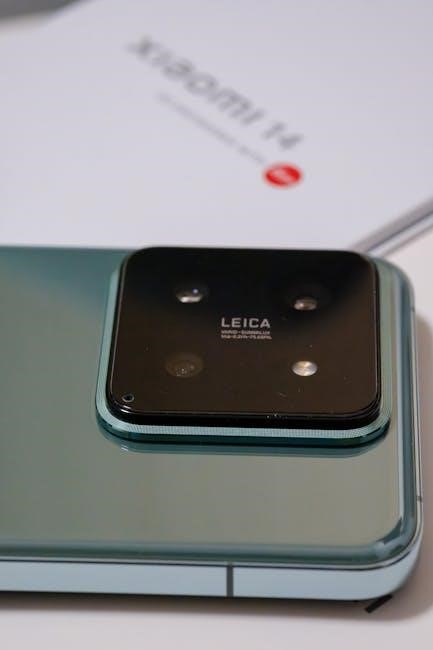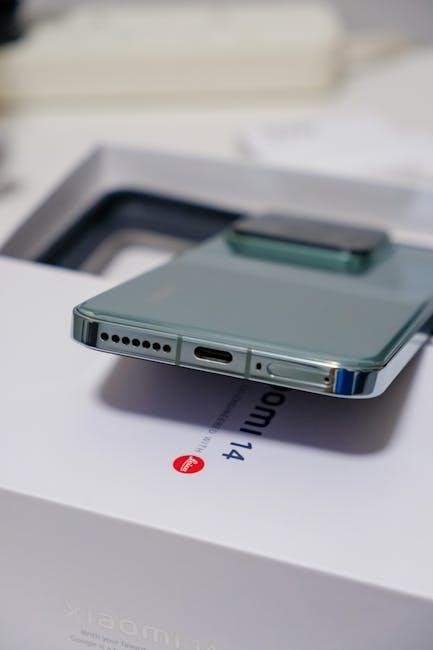
techzz.uk/deducting-your-phone-bill-as-a-business-expense-a-comprehensive-guide/
Phone bills are a common business expense‚ offering opportunities for tax relief. Understanding eligibility‚ documentation‚ and compliance with HMRC ensures accurate and lawful expense claims.
1.1 Understanding the Basics of Expense Deduction
Expense deduction allows businesses to claim tax relief on costs incurred for business operations. Phone bills qualify if used primarily for business purposes. Accurate records and clear documentation are essential to support claims. HMRC requires distinctions between business and personal use to ensure compliance. Understanding these principles helps maximize allowable deductions and avoid potential penalties.
1.2 Importance of Phone Bills in Business Operations
Phone bills are vital for communication‚ client interactions‚ and business efficiency. They facilitate essential operations‚ from customer service to remote work. Accurate tracking ensures billing reflects business use‚ enabling legitimate tax relief claims. Proper documentation supports compliance with HMRC regulations‚ ensuring businesses can deduct eligible portions without issues. This enhances financial management and tax efficiency for all entities.

Eligibility Criteria for Claiming Phone Expenses
Eligibility to claim phone expenses hinges on business usage‚ proper documentation‚ and contractual agreements. HMRC requires clear separation of personal and business use for accurate deductions and compliance.
2.1 Business Use of Personal Mobile Phones
Using a personal mobile phone for business allows claiming a portion of the bill as an expense. HMRC requires documentation to prove business use‚ ensuring accurate deductions. Contractors and sole traders can claim expenses‚ but personal use must remain reasonable. Tracking business calls and maintaining records are essential for compliance and audit purposes.
2.2 Contracts in the Company Name
Contracts in the company name are essential for claiming phone expenses as allowable business costs. Limited companies can claim full tax relief on phone bills if the contract is between the company and the provider. Personal use must remain reasonable‚ but companies can still claim expenses for business-related calls and data usage‚ ensuring compliance with HMRC regulations.
2.3 Sole Traders and Self-Employed Individuals
Sole traders and self-employed individuals can claim a proportion of their phone bills as business expenses‚ provided the phone is primarily used for business. Personal use must be reasonable and not excessive. Claims must be supported by records‚ and only the business-related portion of the bill is eligible for tax relief‚ ensuring compliance with HMRC guidelines.

Documentation and Record-Keeping Requirements
Accurate records of phone bills‚ call logs‚ and business usage must be maintained to support expense claims‚ ensuring compliance with HMRC regulations and audit requirements.
3.1 Maintaining Phone Bills and Call Logs
Keeping detailed phone bills and call logs is crucial for verifying business use. These records help differentiate between personal and professional calls‚ ensuring accurate expense claims and compliance with HMRC requirements. Organizing digital copies securely can prevent loss and simplify audits‚ while highlighting the necessity of clear documentation for tax purposes.
3.2 Tracking Business vs. Personal Usage
Distinguishing business and personal calls is essential for accurate expense claims. Implementing a system to log business-related calls ensures compliance with HMRC guidelines‚ preventing potential disputes. Regularly reviewing usage patterns helps maintain transparency and supports proportional deductions‚ while minimizing the risk of errors in financial reporting and tax submissions.
3.3 Reporting Requirements to HMRC
Accurate reporting of business-related phone expenses to HMRC is crucial. Businesses must maintain detailed records‚ including phone bills and call logs‚ to support claims. Failing to comply with HMRC’s guidelines may result in penalties and delays in tax relief processing‚ ensuring transparency and adherence to regulations is essential for smooth claims processing and maintaining audit readiness.

Types of Phone Contracts and Their Implications
Understanding different phone contracts—SIM-only‚ PAYG‚ and standard—is key for tax deductions. Each type affects business expense claims‚ requiring clear contract terms to ensure compliance with HMRC rules and maximize allowable deductions effectively for accurate financial reporting and tax relief.
4.1 SIM-Only Contracts
SIM-only contracts are popular for business use due to their flexibility and cost-efficiency. Businesses can claim the business proportion of the bill as an expense‚ provided there’s clear documentation of usage. Personal use must remain reasonable‚ and having the contract in the company name simplifies the claiming process‚ ensuring compliance with HMRC regulations.
4.2 Pay-As-You-Go Plans
Pay-as-you-go plans offer flexibility for businesses with variable usage. Only the business proportion of calls exceeding the tariff limit can be claimed as an expense. Personal use must remain reasonable‚ and the contract should be in the company name to simplify deductions. This arrangement ensures compliance with HMRC regulations while maintaining cost control.
4.3 Standard Mobile Phone Contracts
Standard mobile contracts allow businesses to claim all costs as allowable expenses if the contract is in the company name. This includes tariffs and additional charges for business use. Personal use is permitted but must remain reasonable. Clear documentation and separation of business and personal usage are essential to comply with HMRC requirements and ensure accurate expense claims.

Calculating the Deductible Business Proportion
The business proportion of phone bills is calculated based on usage‚ with percentage-based deductions for eligible expenses. Accurate records are essential to support claims to HMRC.
5.1 Percentage-Based Calculation
To determine the deductible business proportion of your phone bill‚ assess the percentage of business usage. If your phone is used 70% for business‚ claim 70% of the bill as an expense. Maintain records to support your claim‚ ensuring accuracy and compliance with HMRC requirements. Regularly review and adjust the percentage as usage patterns change over time.
5.2 Example Scenarios for Proportional Deductions
If your phone bill totals £200 and 70% is for business‚ claim £140. For a £300 bill with 50% business use‚ claim £150. Documenting usage helps verify proportions‚ ensuring compliance with HMRC; Regularly review logs to adjust proportions accurately over time.
Business vs. Personal Use of the Phone
Business use must be clearly distinguished from personal use. Personal use is allowed but must remain reasonable‚ avoiding excessive non-business-related calls or data usage.
6.1 Defining Reasonable Personal Use
Reasonable personal use of a business phone is limited and does not interfere with its primary business purpose. It should not exceed what is considered minor or incidental‚ ensuring the phone remains predominantly for work-related activities. Excessive personal use may lead to tax implications or disqualification of expense claims‚ as per HMRC guidelines.
6.2 Consequences of Excessive Personal Use
Excessive personal use of a business phone can lead to HMRC disallowing the expense claim. This may result in additional tax payments and penalties. Companies must ensure usage remains predominantly business-related to maintain eligibility for tax relief and avoid financial repercussions. Proper documentation and clear usage policies are essential to prevent such issues.

Specific Considerations for Sole Traders
Sole traders can claim phone expenses if the phone is primarily used for business. Documentation of business use proportion is essential for accurate tax relief claims to HMRC.
7.1 Claiming Expenses as a Sole Trader
As a sole trader‚ you can claim phone expenses if the phone is mainly used for business. HMRC requires documentation proving the business use percentage. You can deduct the business proportion of your phone bill from taxable income. Personal use should be minimal and not excessive. Keep records like bills and logs to support your claims during tax filings. Accurate documentation ensures compliance and avoids disputes with HMRC. This helps in maximizing your tax relief and maintaining financial integrity for your business operations. Always ensure the claims align with HMRC’s guidelines for allowable expenses.
7.2 Documentation for Sole Trader Claims
For sole traders‚ maintaining detailed records of phone usage is crucial. Keep copies of phone bills‚ call logs‚ and invoices. Track business calls separately from personal use. HMRC requires evidence of business-related expenses‚ so note the dates‚ times‚ and purposes of calls. This documentation supports your claims and ensures compliance with tax regulations. Accurate records help avoid disputes and facilitate smooth tax filings‚ allowing you to claim the correct business proportion of your phone bill confidently.
Implications for Limited Companies
For limited companies‚ phone bills paid by the business qualify as allowable expenses. Contracts must be in the company name to claim tax relief. Personal use is permitted but must be reasonable to avoid tax implications. Proper documentation and separation of business and personal use are essential for compliance with HMRC regulations. Accurate records ensure lawful expense claims and avoid penalties. Companies can deduct the business proportion of phone bills‚ but personal use should not be excessive. HMRC requires clear evidence of business-related expenses‚ so maintaining detailed call logs and invoices is crucial. This ensures transparency and facilitates smooth tax filings‚ allowing companies to claim the correct business proportion confidently.
8.1 Contract Requirements for Limited Companies
For limited companies to claim phone expenses‚ contracts must be in the company’s name. This ensures expenses are fully tax-deductible. Personal contracts do not qualify for business relief. Proper documentation and clear business use justification are essential. HMRC requires the contract to be between the company and the provider‚ ensuring all costs are eligible for tax deductions.
8.2 Tax Relief on Company-Paid Phone Bills
Company-paid phone bills qualify for tax relief if used for business purposes. Bills must be in the company’s name‚ and personal use should be minimal. HMRC permits full deduction of business-related costs‚ excluding non-business usage. Proper documentation ensures compliance and avoids potential penalties‚ maximizing tax benefits for the company. This applies to all business-related mobile contracts.
Allowable vs. Non-Allowable Expenses
Allowable expenses are business-related costs‚ such as work calls and contracts in the company name. Non-allowable expenses include personal use or excessive non-business-related costs.
9.1 Understanding Allowable Business Costs
Allowable business costs include expenses directly related to business operations‚ such as mobile contracts in the company name and work-related calls. These costs are eligible for tax relief‚ reducing taxable income. Personal use must remain reasonable and not excessive to maintain eligibility for deductions‚ ensuring compliance with HMRC guidelines for accurate expense claims.
9.2 Expenses That Cannot Be Claimed
Certain phone-related expenses are not deductible‚ such as personal calls exceeding reasonable limits‚ non-business contracts‚ and individual tax or National Insurance payments. Additionally‚ costs unrelated to business use‚ like personal device upgrades or excessive personal usage‚ are ineligible for tax relief‚ ensuring only legitimate business expenses are claimed.
Tax and National Insurance Implications
Tax deductions apply to business-related calls‚ while National Insurance contributions may be required for certain phone expenses‚ ensuring compliance with HMRC regulations for accurate claims.
10.1 Tax Deductions on Business Calls
Business calls made using personal or company phones are eligible for tax deductions. Calls exceeding monthly tariff limits do not require National Insurance or tax deductions. Personal use is allowed but must remain reasonable. HMRC requires accurate records to differentiate business and personal calls‚ ensuring compliance and preventing penalties for non-exempt expenses.
10.2 National Insurance Contributions on Expenses
National Insurance Contributions (NICs) may apply to phone expenses under specific conditions. If the company reimburses personal phone bill payments‚ deductions must be made through PAYE and Class 1 NICs. Personal use does not require NIC deductions‚ but accurate records are essential to distinguish business and personal usage‚ ensuring compliance with HMRC regulations and avoiding penalties for non-compliant claims.

Reporting and Compliance
Accurate records and timely submissions to HMRC are crucial. Ensure all phone expense claims comply with regulations to avoid penalties and maintain audit readiness.
11.1 Submitting Expenses to HMRC
Submitting phone bill expenses to HMRC requires accurate documentation and adherence to guidelines. Ensure itemized bills and records of business calls are included. Personal use must not be excessive‚ and any benefits in kind should be reported on the P11D. Timely and compliant submissions prevent penalties and delays in processing claims.
11.2 Avoiding Common Reporting Mistakes
Avoid errors by ensuring accurate separation of personal and business use‚ maintaining detailed call logs‚ and verifying contract details. Failure to document business-only claims or misreporting personal use can lead to penalties. Always cross-check records and ensure compliance with HMRC guidelines to prevent delays or disputes during expense reviews and tax assessments.
Accurate record-keeping‚ clear separation of business and personal use‚ and adherence to HMRC guidelines are essential for successful phone bill deductions. Plan carefully to avoid errors.
12.1 Summary of the Deduction Process
Deducting phone bills involves verifying business use‚ maintaining records‚ and calculating the taxable proportion. Ensure contracts are in the company name for limited entities‚ while sole traders must demonstrate business use predominates. Personal use should remain reasonable‚ with clear documentation to support claims. Compliance with HMRC guidelines is crucial for accurate expense reporting and avoiding penalties.
12.2 Best Practices for Future Claims
Separate personal and business phone use clearly‚ maintain detailed records‚ and ensure contracts are in the company name for limited entities. Regularly review usage patterns to accurately calculate deductions. Stay informed about HMRC guidelines and avoid excessive personal use to prevent tax implications. Proper documentation and compliance ensure smooth‚ lawful expense claims.